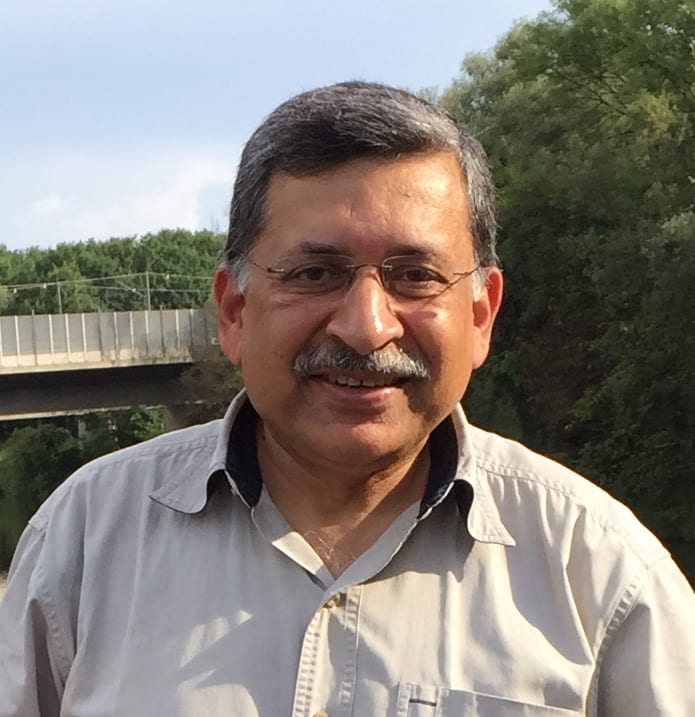Wednesday, February 9th, 2022
8:30 – 10:00 a.m. EST / 6:30 – 9:00 p.m. IST
via Zoom
We were pleased to invite you to the fifth webinar in the 2021-2022 Envisioning India series, co-sponsored by the Sigur Center for Asian Studies and the Institute for International Economic Policy. This is a platform for dialogue and debate. We invited you to engage with us in this series of important discussions.
This event featured Professor Jyoti K. Parikh, Executive Director of Integrated Research and Action for Development, and Dr. Kirit S. Parikh, Chairman of Integrated Research and Action for Development, to discuss “Equitable Action for Climate Change.” Amar Bhattacharya, Senior Fellow at the Global Economy & Development Program at Brookings Institution, and Shreekant Gupta, Professor at the Delhi School of Economics, provided discussant remarks.
In this talk, Professor Jyoti K. Parikh and Dr. Kirit S. Parikh showed that India can live within its 1.50 C budget without much loss in economic growth or consumer welfare. They show this under the assumption that technical progress in renewables and battery costs take place as is expected and that climate finance and access to technology at reasonable cost are available. They discussed various pathways that India can follow with different outcomes and highlight the roles of technology, behavioral change and finance in achieving them.
They further argued that climate science shows that due to lifetimes of over 100 years of CO2, global warming is a function of the stock of GHGs in the atmosphere, i.e. accumulated emissions over a pathway. Thus the responsibility for climate change of different countries should be based on their cumulated emissions since 1990. This should be the indicators for climate discourse and not just on their annual emissions. An annual fee for parking their emissions in the global space can encourage countries to delay their emissions as well as promote negative emissions. A $1 annual fee per tonne of CO2 space occupied from all countries can collect US $700 billion per year. They suggested that if a substantial portion is given back to countries as compensation for their climate action, it should make such a scheme acceptable to all.
The Envisioning India series is organized under the stewardship of IIEP Director Jay Shambaugh, Professor of International Affairs and Professor of Economics, and IIEP Distinguished Visiting Scholar Ajay Chhibber.
About the Speakers:
 Professor Jyoti K. Parikh is the Executive Director of Integrated Research and Action for Development (IRADe), New Delhi. She was a Member of the Prime Minister’s Council on Climate Change–India and is a recipient of Nobel Peace Prize awarded to IPCC authors in 2007. She served as the senior professor and Acting Director of Indira Gandhi Institute of Development Research (IGIDR), Mumbai 1986-03. IIASA, Austria for 8 years (1980-86, 76-78) and Planning Commission, as senior energy consultant at New Delhi (1978-80).
Professor Jyoti K. Parikh is the Executive Director of Integrated Research and Action for Development (IRADe), New Delhi. She was a Member of the Prime Minister’s Council on Climate Change–India and is a recipient of Nobel Peace Prize awarded to IPCC authors in 2007. She served as the senior professor and Acting Director of Indira Gandhi Institute of Development Research (IGIDR), Mumbai 1986-03. IIASA, Austria for 8 years (1980-86, 76-78) and Planning Commission, as senior energy consultant at New Delhi (1978-80).
She has served as energy consultant to the World Bank, the U.S. Department of Energy, EEC, Brussels and UN agencies such as UNIDO, FAO, UNU, and UNESCO, Environment Consultant to UNDP, World Bank and so on. She worked as an advisor to various ministries for Government of India.
She obtained her M.Sc. from University of California, Berkeley, in 1964 and Ph.D. in Theoretical Physics from University of Maryland, College Park in 1967. She has guided Sixteen Ph.D./Masters theses in energy, environment and climate change area and given lectures in more than 40 countries around the world. The topics ranged from vulnerability and adaptation of agriculture, forestry, power sector, construction sector, and carbon emission baselines for power, transport, cement and steel sector.
Her publications include nearly 200 project research papers and 25 books and monographs in the area of energy economics, climate change and modeling, energy technology assessment, rural energy, power sector, environment economics, natural resource management and climate change.
 Dr Kirit S. Parikh is the Chairman of Integrated Research and Action for Development, IRADe, a non-profit think tank that works on policies in the areas of energy, climate change, urban issues, agriculture and poverty. He was honored with Padma Bushan (third-highest Civilian Award) by the President of India in March 2009 and shared the Nobel Prize in 2007 given to IPCC authors. He was a Member of the Economic Advisory Councils (EAC) of five Prime Ministers of India, Atal Behari Vajpayee, P.V. Narasimha Rao, Chandra Shekhar, V.P.Singh and Rajiv Gandhi. He was Member of Planning Commission (2004-09) in charge of Energy, Water and Perspective Planning. He was the principal architect of India’s official Integrated Energy Policy.
Dr Kirit S. Parikh is the Chairman of Integrated Research and Action for Development, IRADe, a non-profit think tank that works on policies in the areas of energy, climate change, urban issues, agriculture and poverty. He was honored with Padma Bushan (third-highest Civilian Award) by the President of India in March 2009 and shared the Nobel Prize in 2007 given to IPCC authors. He was a Member of the Economic Advisory Councils (EAC) of five Prime Ministers of India, Atal Behari Vajpayee, P.V. Narasimha Rao, Chandra Shekhar, V.P.Singh and Rajiv Gandhi. He was Member of Planning Commission (2004-09) in charge of Energy, Water and Perspective Planning. He was the principal architect of India’s official Integrated Energy Policy.
He obtained his MTech from IIT-Kharagpur, Doctor of Science in Civil Engineering from MIT and also an S.M. in Economics from MIT. He has been a Professor of Economics since 1967 and was the founding Director of IGIDR. He has authored, co-authored and edited 30 books in the areas of planning, energy and power systems, energy modeling and planning, energy policy, energy economics, inclusive growth, and strategies for low carbon development.
About the Discussants:
 Amar Bhattacharya is a Senior Fellow at the Global Economy and Development Program at Brookings Institution, Visiting Professor in Practice at the London School of Economics and Co-Lead of the Sustainable Growth and Finance Initiative of the New Climate Economy under the Global Commission on the Economy and Climate. His focus areas are the global economy, sustainable finance, global governance, and the links between climate and development, including on the role of sustainable infrastructure. He co-led the Independent Expert Group on Climate Finance commissioned by the UN Secretary General. From April 2007 until September 2014 he was Director of the Group of 24, an intergovernmental group of developing country Finance Ministers and Central Bank Governors. Prior to taking up his position with the G24, Mr. Bhattacharya had a long-standing career in the World Bank. His last position was Senior Advisor to the President on the Bank’s international engagements and Head of the International Policy and Partnership Group. He completed his undergraduate studies at the University of Delhi and Brandeis University and his graduate education at Princeton University.
Amar Bhattacharya is a Senior Fellow at the Global Economy and Development Program at Brookings Institution, Visiting Professor in Practice at the London School of Economics and Co-Lead of the Sustainable Growth and Finance Initiative of the New Climate Economy under the Global Commission on the Economy and Climate. His focus areas are the global economy, sustainable finance, global governance, and the links between climate and development, including on the role of sustainable infrastructure. He co-led the Independent Expert Group on Climate Finance commissioned by the UN Secretary General. From April 2007 until September 2014 he was Director of the Group of 24, an intergovernmental group of developing country Finance Ministers and Central Bank Governors. Prior to taking up his position with the G24, Mr. Bhattacharya had a long-standing career in the World Bank. His last position was Senior Advisor to the President on the Bank’s international engagements and Head of the International Policy and Partnership Group. He completed his undergraduate studies at the University of Delhi and Brandeis University and his graduate education at Princeton University.
 Professor Shreekant Gupta is Professor, Delhi School of Economics, University of Delhi. He is also President, Indian Society for Ecological Economics and Associate Editor, Indian Economic Review. His areas of research and teaching are environmental economics, public economics, environment and development and climate change economics. In addition to Delhi University he has also taught at the National University of Singapore, Jawaharlal Nehru University and Nazarbayev University.
Professor Shreekant Gupta is Professor, Delhi School of Economics, University of Delhi. He is also President, Indian Society for Ecological Economics and Associate Editor, Indian Economic Review. His areas of research and teaching are environmental economics, public economics, environment and development and climate change economics. In addition to Delhi University he has also taught at the National University of Singapore, Jawaharlal Nehru University and Nazarbayev University.
He received his PhD in Economics from the University of Maryland College Park in 1993, MA Economics from Delhi School of Economics (1982) and BA (Hons) Economics from Shri Ram College of Commerce (1980). He was Fulbright Fellow at the Massachusetts Institute of Technology (2002) and Shastri Fellow at Queens University, Canada (2001).
Prior to joining Delhi School of Economics in 1997, he was Fellow, National Institute of Public Finance and Policy, New Delhi (1993-95) where he headed the Environmental Policy Cell. He has also worked as an environmental economist at the World Bank at Washington DC and as a career economist in the Indian government (Indian Economic Service cadre). His policy experience includes Director of National Institute of Urban Affairs, New Delhi. He is a Lead Author of the forthcoming Sixth Assessment report of the Intergovernmental Panel on Climate Change (IPCC) and was also a coordinating lead author of the IPCC Fifth Assessment Report.
Professor Shreekant Gupta’s Google Scholar profile
Professor Shreekant Gupta’s Delhi School of Economics profile
